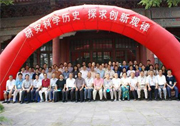| 中文题目: | 明季西方高远测量仪器的引介与影响——以《测量全义》之“小象限”为中心 | ||||||
| 英文题目: | The Introduction of the Western Surveying Instruments for Measuring Heights and Distances in Late Ming and Their Reception: A Case Study on the "Small Quadrant" in Celiang Quanyi | ||||||
| 作 者: | 潘澍原 | ||||||
| 刊物名称: | 自然科学史研究 | ||||||
| 发表年度: | 2018 | ||||||
| 卷: | 36 | ||||||
| 期: | 4 | ||||||
| 页码: | 462-488 | ||||||
| 中文摘要: | 明季西学随耶稣会士入华,仪器作为西方科学文化的重要物质载体尤为时人瞩目,切合社会需求的高远测量仪器即其中之一,主要有象限仪、十字杆、几何矩及设有影矩的星盘或象限仪等。罗雅谷、汤若望等译撰的《测量全义》(1631)中所介绍的"小象限"并非象限仪,而是一种影矩标度投射于象限弧的圆边几何矩,很可能来自天文学家、制图学家阿皮安的新近发明或类似设计,展现出耶稣会士输入时代新知的积极努力。受此启发,明季儒士陈荩谟设计、制作出形制相近的"菴矩度",并藉《周髀算经》的注释文句予以解释,表现出以本土传统接纳外来知识、以新颖学说诠释古代经典的学术旨趣。 | ||||||
| 英文摘要: | In the dissemination of Western learning by the Jesuits in late Ming China, various instruments bearing the Western scientific culture called great attention. As a category, the surveying instruments for measuring heights (or depths) and distances (or breadths, etc.) were introduced due to the perceived relevance of their practical functions to social life, including quadrant, cross-staff,geometric square and planispheric astrolabe or quadrant with shadow square(s) . The "Small Quadrant", one of the surveying instruments introduced in Celiang Quanyi (Complete Explanations of Measurement,1631) which was translated and compiled by the Jesuits Giacomo Rho and Johann Adam Schall von Bell, was a circular geometric square in which the gradations of a shadow square were projected onto the quarter-circle, rather than a real quadrant. The prototype of this instrument probably was a new invention of the German astronomer and cartographer Peter pian, or its derivative designs. Inspired by this “Small Quadrant”, the Confucian scholar Chen Jinmo designed and produced a similar instrument named “Xiao'an Geometric Square” during the last years of the Ming dynasty. In addition, he provided an explanation of his design by making use of some annotations for the Chinese mathematical and astronomical classic Zhoubi (Gnomon of the Zhou) . This case showed the Jesuits' efforts to introduce European cutting-edge knowledge to China, as well as the Chinese scholars' approach to accepting foreign knowledge in the context of their indigenous traditions and to interpreting ancient Chinese classics with new learning. | ||||||





